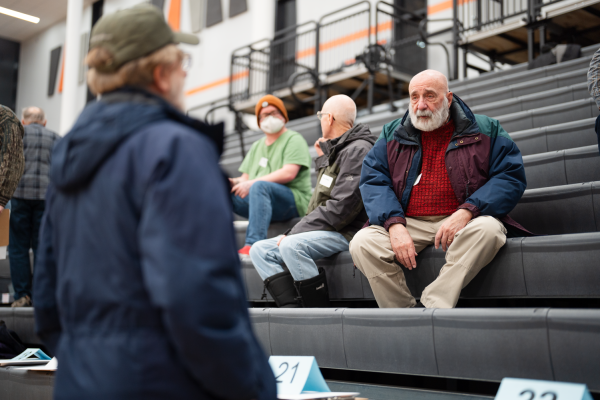Isaac weakening, but relentless pounding ‘not even half over’
August 29, 2012
Hurricane Isaac weakened Wednesday morning but remained at hurricane strength as officials warned the area will have to endure many more hours of pounding rain.
“For many people, it’s not even half over,” Richard Knabb, director of the National Hurricane Center, said Wednesday morning.
The heavy rain will persist “all day today, into tonight, into tomorrow,” he said.
As of 9 a.m. CT, Isaac’s maximum sustained winds were at 75 mph — just barely hurricane strength, which begins at 74 mph.
But the storm continued to move slowly, at only 6 miles per hour, allowing for an extended, relentless lashing of much of the Gulf Coast.
It was centered about 40 miles southwest of New Orleans and about 5 miles east of Houma, Louisiana.
The center “will move over Louisiana today and tomorrow, and over southern Arkansas early Friday,” the hurricane center said.
Forecasters predict Isaac will continue to weaken as it moves over land during the next 48 hours, but threats of dangerous storm surges and flooding will continue through Wednesday night, the hurricane center said.
More than half a million customers were without power in Arkansas, Louisiana, Mississippi and Alabama, according to the Entergy and Cleco power companies.
Three adults and an infant in Mississippi were rescued overnight from a houseboat, the state’s emergency operations center said Wednesday.
Isaac “delivered more of a punch than originally thought,” said Billy Nungesser, president of Plaquemines Parish in Louisiana, one of the worst-hit areas.
“We have reports of people on their roofs, in attics, in 12 to 14 feet of water,” he said.
Some residents saved three people, including a woman who was on her roof, Nungesser said.
Those homes were on the east bank of a levee, but “this storm is going to kick around and deliver the same type of flow to the west bank,” he said.
Emergency management officials reported the overtopping of an 18-mile stretch of the back levee in Plaquemines Parish from Braithwaite to White Ditch, which will “result in significant deep flooding in the area,” the National Weather Service of New Orleans said.
The levee was not upgraded after Hurricane Katrina, which struck the region seven years ago Wednesday. That levee, according to the National Weather Service, is maintained by the parish and is not part of the federal hurricane protection levee system.
Katrina breached the levee in two places, the Army Corps of Engineers said.
Parish resident Gene Oddo told CNN affiliate WWL that he was in his attic with his wife and 18-month-old baby girl.
“The water came up so quick, it looks like we lost everything,” he said. He and his wife have drinking water, baby food and other necessities, he said.
“I would rather be here to save what I can, because insurance doesn’t cover all that much,” Oddo said.
His neighbors, including a 92-year-old man who refused to leave his home, were in a similar predicament, he said.
WWL later reported that parish deputies were fighting the wind and rain to get boats out to rescue people.
The New Orleans levee system and pump stations were working furiously to deal with the deluge. The system was rebuilt and reinforced at a cost of $14 billion after it failed when Katrina struck in 2005. Nearly 1,800 people died as a result of that storm, the majority when levees failed and flooded.
“People who went through Katrina are pretty nervous about storms, and large numbers of people have left,” Lynn Magnuson, 58, said in a CNN iReport.
Magnuson said the Lower 9th Ward, which was hard hit by Katrina, “is pretty empty right now.”
The National Weather Service warned early Wednesday that heavy rainfall across metropolitan New Orleans and nearby coastal communities will probably result in flash floods.
“There is no evidence of any (water) overtopping (canals)” in the city, New Orleans Mayor Mitch Landrieu said. “We have full confidence the levees will hold.”
Even so, he and other officials were taking no chances.
“We’re in a hunker-down phase now, because this storm could be over us for a while with a lot of wind and rain,” Landrieu said.
“Hunker down means hunker down and prepare to ride it out.”
The mayor tweeted that about 1,000 National Guard troops and more than 2,900 law enforcement officers are in the city ready to address issues related to the storm.
Plaquemines Parish was flooded in some areas that were not flooded by Katrina, said Nungesser, the parish president.
Isaac made its second landfall at about 2 a.m. CT near Port Fourchon, in southeast Louisiana 60 miles southeast of New Orleans, after slamming first into Plaquemines Parish along the coast and then wobbling back over the water near the mouth of the Mississippi River, the National Hurricane Center said in an early morning update.
The storm has caused significant surges and flooding, including in some places not directly in Isaac’s path. Storm surges of 9.9 feet have been reported in Shell Beach, Louisiana, and 6.2 feet in Waveland, Mississippi, according to the hurricane center.
Forecasters predict water levels to rise between 6 and 12 feet on the coast in Mississippi and southeastern Louisiana alone.
In Biloxi, Mississippi, 50-year-old Alfonso Walker was keeping a close eye on the progress of the 195-mile wide hurricane.
He watched as a storm surge sent waves crashing over the pier at the IP Biloxi Hotel & Casino.
“I went through Hurricane Camille in 1969 and Hurricane Katrina in 2005, where I lost everything, and every other hurricane in between those two that came through,” he said in a CNN iReport.
“So I’m a little concerned.”
Isaac, which was a tropical storm last week in the Atlantic Ocean, killed nearly two dozen people in Haiti and the Dominican Republic before starting its journey across the Gulf of Mexico.
On Tuesday, Isaac grew to a Category 1 hurricane. It is significantly weaker than Category 3 Katrina, though forecasters warn it is capable of causing significant flooding.
Isaac earlier prompted three airports to close — in New Orleans; Gulfport-Biloxi, Mississippi; and Mobile, Alabama.
Mobile Regional Airport said Wednesday it was reopening runways, but did not know immediately when flights may resume.
Major ports along the Gulf Coast and the Mississippi River from Baton Rouge to its mouth have been closed, according to the U.S. Coast Guard. Amtrak suspended train service to and from New Orleans on Wednesday, and area businesses have come to a standstill.
In Mississippi, more than 1,800 people were staying in 33 shelters in 16 counties, according to the state’s emergency management agency.
The Nuclear Regulatory Commission said it sent additional inspectors to two Louisiana nuclear plants in the storm’s path, as power company Entergy planned a “controlled shutdown” of one of them Tuesday afternoon.
Wholesale gas prices declined Tuesday after surging nearly 8 cents a day earlier as then-Tropical Storm Isaac veered toward the Gulf Coast, causing many oil refineries to shut down as a precaution.
Analysts said that panic buying is over and that Isaac is unlikely to do lasting damage to oil refineries and infrastructure along the Gulf Coast.
— CNN’s Greg Botelho, Brian Todd, Soledad O’Brien, Ed Lavandera, Anika Chin, Mike Ahlers, Aaron Cooper and Ed Payne contributed to this report.














